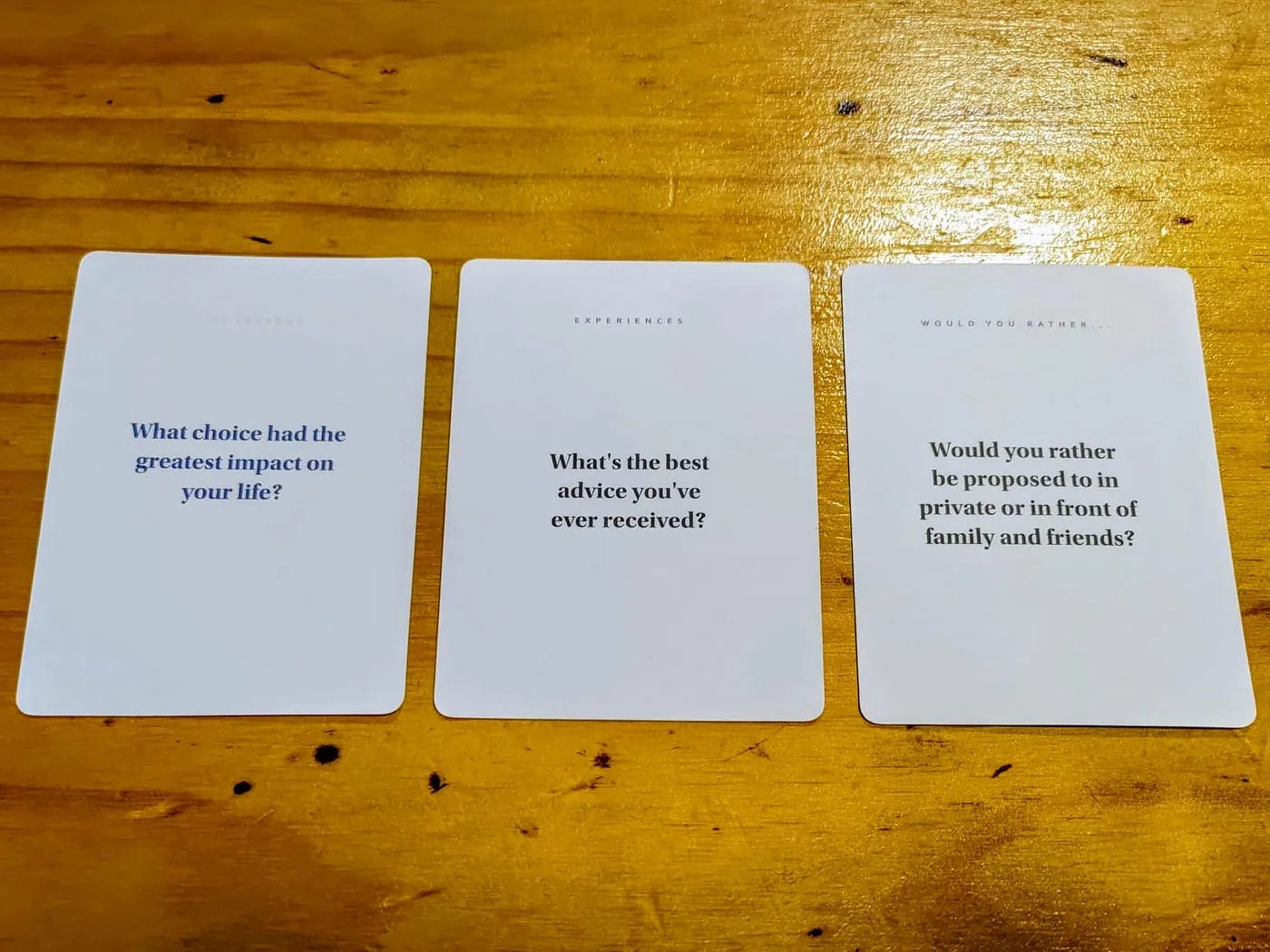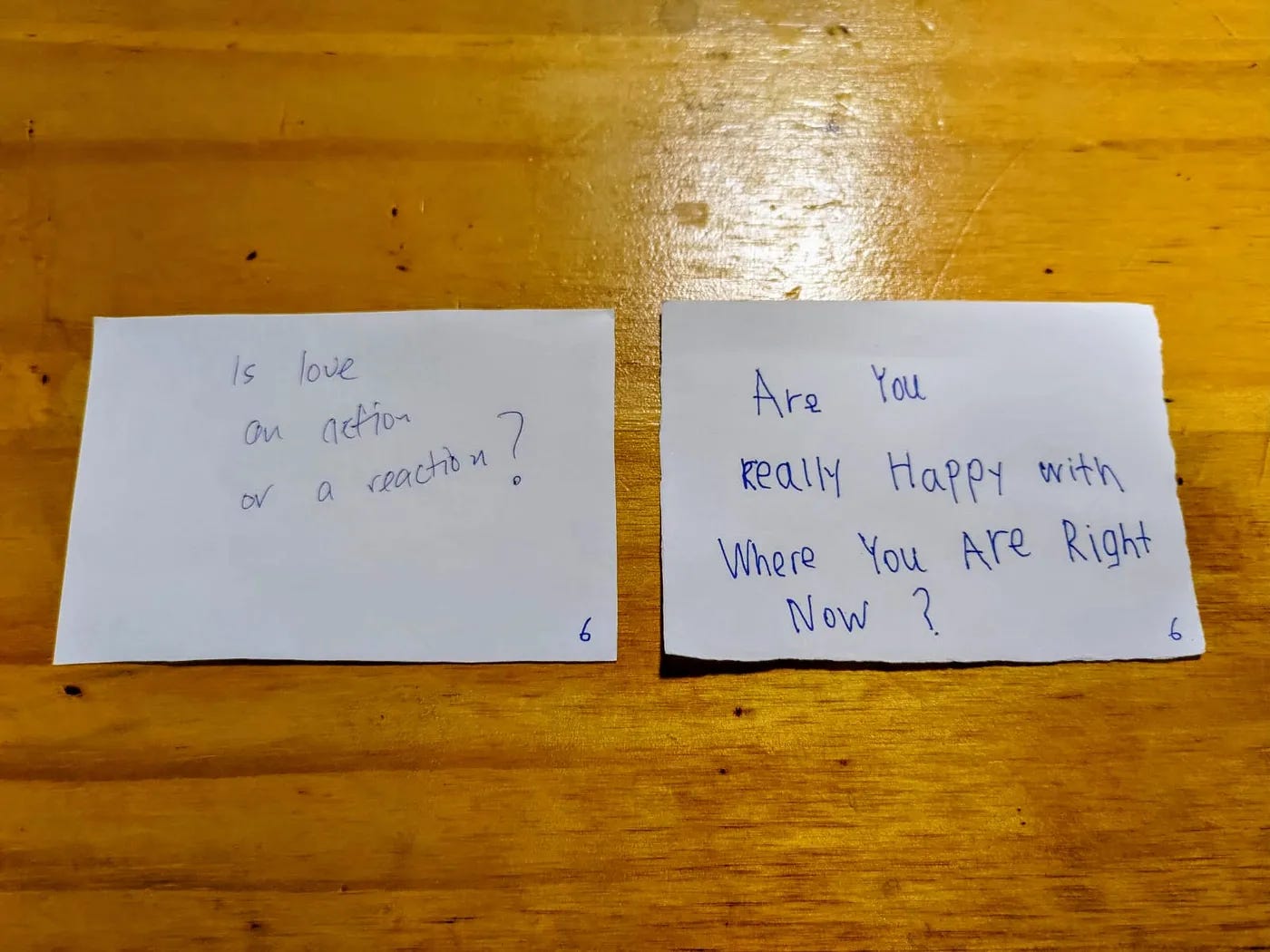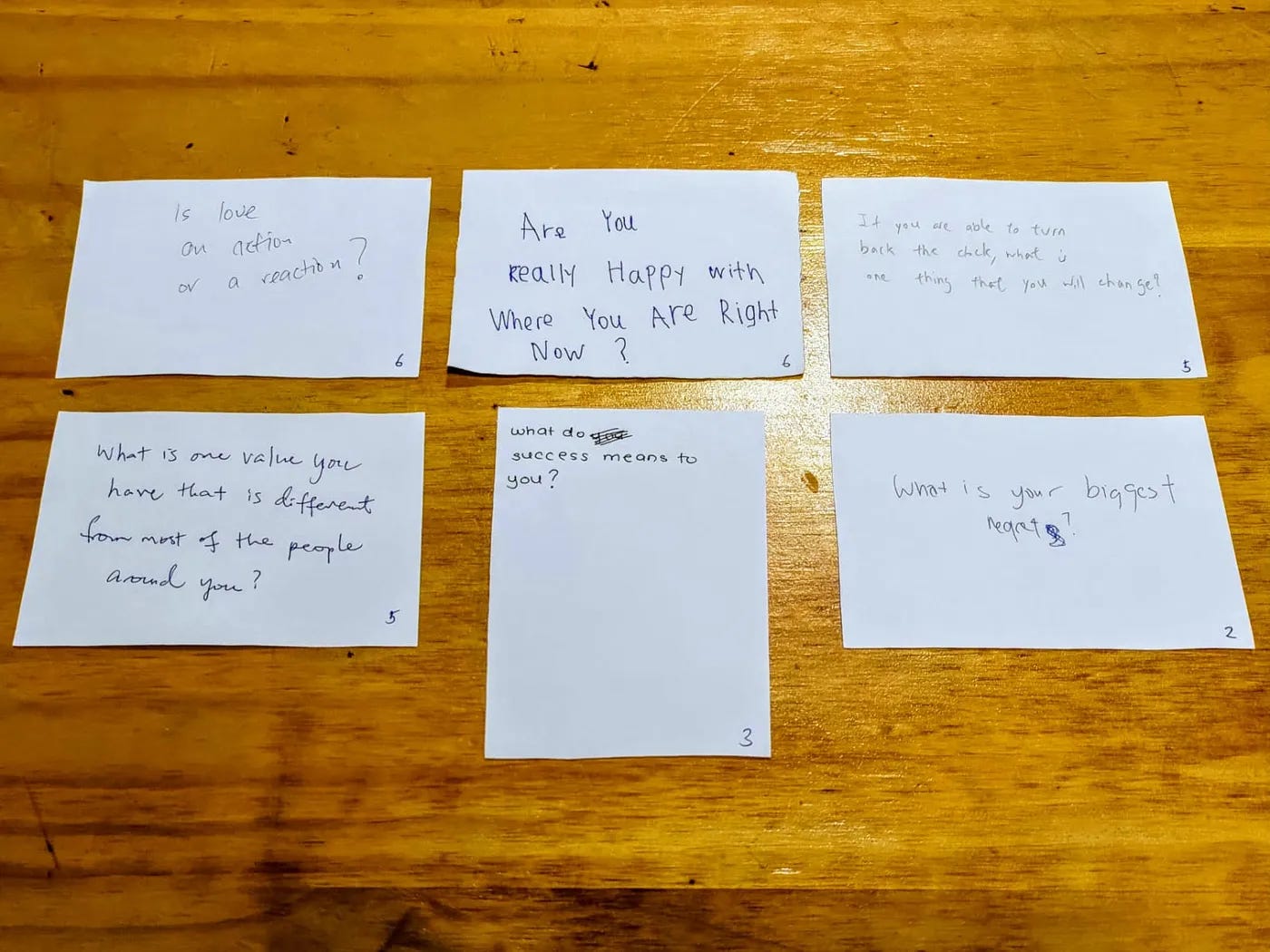Exploring Love, Happiness, and Success: Deep Conversations with Curious Souls in Singapore
In a world that often feels fast-paced and disconnected, the Curious Souls Cafe offers a refreshing space for meaningful conversations and self-reflection. Recently, we had the privilege of hosting one of these unique meetups for the second time in Singapore on January 12, 2025, as a way to find purpose and connection. This post delves into the rich tapestry of conversations and connections that emerged during the event, highlighting the power of intentional dialogue and shared vulnerability.
What is the Curious Souls Cafe?
The Curious Souls Cafe is a casual, non-academic philosophy meetup designed to foster introspection and meaningful dialogue. It’s a space where anyone can speak up, share their thoughts, and explore life’s big questions in a supportive environment. The event is structured mainly into two rounds:
Round 1: Curated Questions
Participants pick three question cards from various categories and choose one to discuss as a group. These questions are designed to spark deep reflection and storytelling.Round 2: Participant-Generated Questions
Participants create their own questions, leading to even more personalized and thought-provoking discussions.
Aside from these questions, additional questions can also arise organically throughout the meetup.
Round 1: Curated Questions
1. Pivotal Life Choices: Reflections on Transformation, Resilience, and Self-Discovery
“What choice had the greatest impact on your life?”
This question, introduced by one of our facilitators, served as a powerful catalyst for personal reflection. Participants shared pivotal moments that shaped their lives, revealing profound themes of transformation, resilience, and self-discovery.
Leaving a Long-Term Relationship: One participant shared how ending a long-term relationship marked a turning point in her life. This decision led to a journey of self-discovery, as she rediscovered her identity, hobbies, and desires. She also recounted navigating difficulties, such as recovering from knee surgery during the pandemic, which taught her to embrace independence and find strength in solitude.
Reapplying to University: Another participant spoke about how a colleague’s encouragement to reapply to university changed his life trajectory. After a period of demotivation during the two-year long national service in Singapore, this decision led to a new career path in cybersecurity, highlighting the profound impact of external support and seizing opportunities.
Leaving a Toxic Job: A third participant described how leaving a stressful and toxic work environment allowed her to reclaim her life. She emphasized the importance of work-life balance and the realization that personal well-being should never be sacrificed for career advancement.
These stories underscored the diverse catalysts for life-changing decisions — whether it’s a relationship, a piece of advice, or a desire for personal well-being — and the transformative power of self-awareness.
2. Transformative Advice: Wisdom That Reshaped Lives
“Best advice you have ever received?”
Posed by another participant who arrived early, this question elicited a range of impactful guidance and wisdom. Participants shared advice that had shaped their lives, revealing the importance of mindset, resilience, and the influence of others.
Training the Mind to Reframe Pain: One participant shared advice from her doctor about managing chronic pain after surgery. The guidance to focus on mental strategies to cope with discomfort helped her overcome feelings of helplessness, eliminate reliance on painkillers, and regain a sense of control.
Reapplying to University (Revisited): The participant who described his experience at university earlier reiterated the life-changing impact of a friend’s encouragement to reapply. This highlighted how a single piece of advice can alter one’s life trajectory.
The Mind-Body Connection: Another participant shared advice from a doctor about the link between stress and illness. This insight led the person to prioritize mental well-being, underscoring the importance of holistic health.
These stories demonstrated that impactful advice can come from various sources — medical professionals, friends, or colleagues — and can address both physical and emotional challenges.
3. The Private Proposal Debate: Intimacy vs. Public Spectacle
“Would you rather be proposed to in private or in front of family and friends?”
Chosen by the same participant who shared his university journey, this question sparked a lively discussion about personal preferences, relationship dynamics, and societal expectations.
Preference for Private Proposals: Most participants favored private proposals, valuing intimacy and emotional safety over public displays. Concerns about potential awkwardness or pressure in public settings were also raised.
Challenging Traditional Assumptions: The conversation questioned traditional gender roles, exploring the possibility of women proposing in a cosmopolitan city like Singapore. This highlighted a desire for more inclusive and diverse expressions of love.
Empathy and Consideration: Participants emphasized the importance of considering the feelings of the person being proposed to, ensuring they feel comfortable and respected.
This discussion revealed the complexities of personal preferences and the impact of societal norms on our perceptions of relationships.
Round 2: Participant-Generated Questions
Here are the two questions which received the most votes in the second round, the Bring-Your-Own-Question section.
1. The Duality of Love: Action or Reaction?
“Is love an action or a reaction?”
Posed by one facilitator, this question sparked a deep philosophical debate about the nature of love.
Love as a Choice: The facilitator argued that love is a conscious action, requiring effort, responsibility, and commitment, rather than being driven by impulses and compulsions.
Love as a Response: Others suggested that love can also be a reaction to being loved, highlighting its reciprocal nature.
Unconditional vs. Self-Destructive Love: The conversation expanded to explore unconditional love, such as a parent’s love for a child, and the potential for self-destructive love rooted in self-rejection or control.
Other related concepts another facilitator and participants brought up:
Reciprocity Styles: Giver, taker and matcher from Adam Grant’s book, Give and Take, which helps us identify relationship dynamics.
Boundaries: Dr. Henry Cloud’s advice from his book of the same title — if one is not happy about helping someone, they shouldn’t do it, emphasizing the importance of setting limits in relationships to avoid resentment and burnout.
Filial Piety: An attitude of respect for parents in societies influenced by Confucianism. One participant recalls a recent news article about how some young Singaporeans think filial piety should go both ways, instead of being unconditional.
This discussion underscored the multifaceted nature of love, emphasizing intentionality, reciprocity, and self-awareness.
2. Finding Fulfillment: An Exploration of Personal Happiness and Gratitude
“Are you really happy with where you are right now?”
This question from the participant who recounted his university journey earlier prompted genuine reflections on personal fulfillment and life satisfaction.
Experiences of Dissatisfaction: The participant who raised this question honestly shared feelings of emptiness and disconnection after transitioning from university to the workforce. He spoke candidly about his search for purpose and meaning beyond material achievements as a Christian.
Joy, Community and Mindfulness: Others emphasized the need for joy, connection, and mindfulness to counteract modern challenges, such as feelings of isolation and social media comparisons.
Gratitude and Perspective: Participants stressed the importance of gratitude, finding contentment in small, everyday moments, and reframing negative situations with the understanding that happiness is a choice. One facilitator further added an advice from a previous session in Taipei that a gratitude journal can help us mitigate the impact of negativity bias by reminding us of good moments.
In a sudden turn of events, this self-reflective question sparked a discussion on a relevant follow-up question about the multifaceted nature of success, posed by a female participant:
“What does success mean to you?”
Self-Comparison: According to her male friend, whom she brought to the event, success should be seen as growth measured against one’s past self, rather than in comparisons with others. In response to her struggle with social media comparisons, he suggested self-growth as the most meaningful metric of success.
Human Understanding: The original participant who raised the happiness question shared that he tied success to understanding “how to be human.” He has been exploring philosophical books and joining book clubs to better grasp how humans should act and live meaningfully.
Inner Peace: To another participant, success meant achieving mental clarity and freedom from “compulsive” thoughts and distractions. She mentioned the character “Wukong” from Journey to the West literally means “understand emptiness” in Chinese, which suggests that individuals should find an inner state of peace and meaning rather than seeking external validation.
A Journey of Personal Fulfillment: The same participant also described success as pursuing passions. She brought up another concept, ikigai, which is the Japanese idea of finding something that you’re willing to spend your whole life doing.
The thoughtful Singaporean group also reflected on their privilege of grappling with “first-world problems.” Overall, participants shared a range of perspectives on what success means to them, highlighting its deeply personal and multifaceted nature.
This rich discussion underscores the complexity of defining success. For some, it is less about external validation and more about inner fulfillment, growth, and living authentically. While we may be still searching for “success”, we should feel inspired by the journey itself.
Conclusion: The Transformative Impact of the Curious Souls Cafe
In a world that often prioritizes speed and productivity, the Curious Souls Cafe served as a powerful reminder to slow down, engage with life’s big questions, and connect with others on a deeper level. It was a testament to the transformative power of human connection, introspection, and the pursuit of a meaningful life.
Key takeaways from this episode of Curious Souls Cafe included the value of diverse viewpoints, practical insights on relationships and self-understanding, an awareness of privilege, and gratitude, as well as a desire for continued connection and community.
Participants departed with a deepened appreciation for vulnerability, a sense of gratitude, and a renewed commitment to embracing curiosity, life’s complexities, and the journey of self-discovery.







